Part Two: Interviews with other palace musicians
On our third day in the field we focused on two things:
1) Understanding better how the royal drums of the Buganda Kingdom are made
2) Interviewing other surviving musicians from the Buganda Palace
Here’s our summary of part two:
We travelled to two separate villages to meet four other surviving members of the royal palace musicians: a flute player, a trumpeter and two members of a xylophone-drumming team. A note here on surviving musicians: James Isabirye continues in his quest to track down surviving members of the musician corp. The good news is that there are some. The bad news is that the group is declining rapidly. In some cases, we refer to musicians as the ‘last surviving’ musician. This is based on James’ best reckoning, having tried for years to find others. Neither James nor the musician involved wants the title of ‘last surviving’ and we would love to be proven wrong. Musisi is looking for more drummers and the ones we talked to today are desperate to find others that played with them.
Richard Ssewannyana
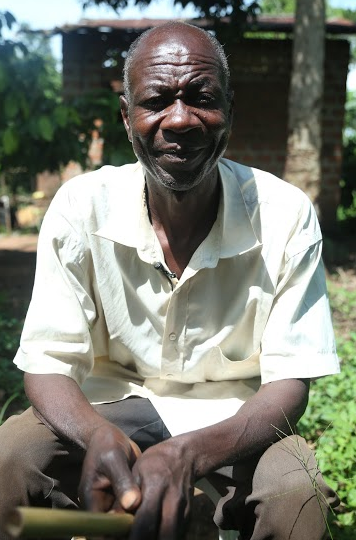
We first travelled about an hour from Mukono to the village of Bamusuta B Kizimula to meet with Richard Ssewannyana. As we believe Musisi is the ‘last surviving’ royal drummer, we believe Richard is the last surviving royal flutist. Please, let’s be wrong here. We first interviewed Richard:
“I am Richard Ssewannyana, son of Paulino Kajubi, whos father was Buko Ssempiira. My village is Ndese, in sub-county Kasawo, of County Kyaggwe. My grandfather used to play the flute in the palace but he was aging and wanted a family member to continue to play. I tried to play with him all the time and learned a few songs. In 1966, I was taken to the palace as a servant boy. My father also wanted to play the flute and replace his father. But he tried to play and failed to learn. But he pretended to play at all performances, acting like he was blowing the flute while his band-mates played. My father was in the palace pretending to play the flute and desperate to replace my grandfather but time was running out.
Over time, the other players realised he couldn’t play. So they asked him to lead the next song, to be the starter. But he failed. So they then asked him to play any song of any of the ones they had been playing since he joined the palace. And he couldn’t. And they were very mad because he had taken a salary as a player and they felt he was a robber.
So when my father realised he had been found out and that he wouldn’t replace his father there was a panic and a desire that I go to the palace to replace my grandfather. So I played in the place of my grandfather for about two months, but then there was suddenly chaos. There was no other schooling for me or other musicians– this was my education and job.
One day the Prime Minister, Mayanja Nkangi, came into the palace. He said all the village chiefs of the king, including Buddu, had been arrested. And he warned us and the king, Muteesa, that we must flee.
And the king had an electronic machine gun. And then the Prime Minister left and then the shooting started. There were lots of bullets. It was the 24th of May and there was chaos – a lot of people dying.
After some time, the shooting stopped because the soldiers feared the gun and the government brought in some Tanzanian soldiers to help with the attack. So early morning on the 25th, the soldiers attacked again from all sides and there were bullets everywhere.
So the shooting went on all over and then they found out the King’s gun needed electricity, so they figured out to turn off the power. How old was I? I was born in 1952, so I was 14 years old. So after the shooting was over my mother sent my father to the palace to find me. But the people there said that there was so much shooting that it was clear everyone was killed. So when he returned from the palace he told everyone I was dead.
But when the soldiers took over the palace they took us to prison. And I was there for three weeks but they would release me only if I signed a paper saying I didn’t have a gun and wouldn’t fight. I signed. So then a man came in and said that anyone can leave who lives close by. But I lived far away and they said those that lived far away could go and wait back in the prison another week. But I didn’t want that and knew I needed to leave. One of the boys had a mother that was close by: she was at Kyaliwajjala.
So a group of the young boys all decided to go with him to his mother, and we all climbed in a bus to travel to his house. There was an older man on the bus who knew the village. When he climbed on the bus, he knew Kizito (the boy who’s mum we were visiting and Musisi’s half-brother, shared mother).
The gentlemen said that when we reached the village he would bike ahead and tell the village we were coming, so we walked very slowly to the village. But when we got to the village I saw a sight I had never seen before. By the time we arrived the village had put on a whole celebration and had killed a goat. But first we cleansed ourselves to take off the stink of prison. We were washed in water and herbs to clean off the prison.
We joined the goat roasting and while we sat there people came up and gave money to us in baskets and we were so happy.”
After we interviewed Richard, he played two songs for us: Ssematimba, and Gganga alula.
We then left Richard and had a lovely moment during our exit; we were joined by a father and his very young daughter playing guitar and shaker singing traditional folks songs. We did some filming and will try to post a little clip soon.
Ssaalongo Byakyalo Kakanzu
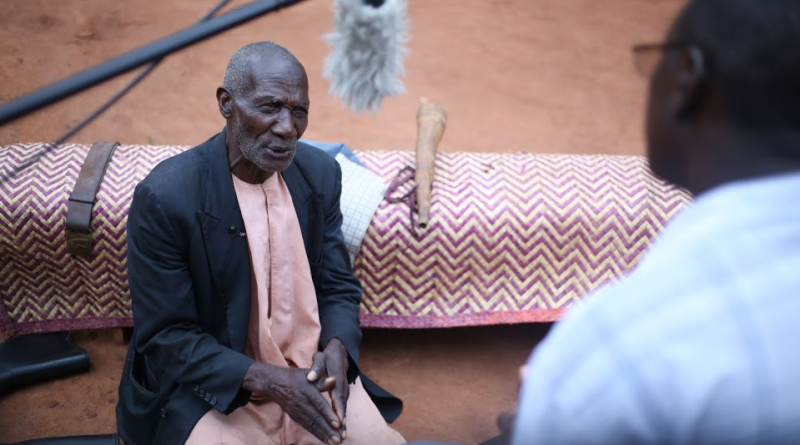
We travelled another thirty minutes to the Ggavu Kikondere Zone, where we met Ssaalongo Byakyalo Kakanzu, one of the ‘last surviving’ trumpet players. Here is his story:
“My name is Ssaalongo Byakyalo Kakanzu. Let me first show you my belt, the Kanzu, which we wore at the palace. On the buckle you see the symbol of the Buganda King. This is the Ekkondeere (singular for trumpet) that we played and it had a string and we wore it around our neck when not playing. I learned to play the trumpet from my grandfather and father, and the village where I came from all learned to play the trumpet. The palace knew we had the best trumpet players. All children learned to play and it was the parents’ job to teach the children how to play.
We didn’t live in the palace so we waited until we were called to play. Every day was a great day at the palace and the one thing I learned was to be humble. When the king came in and sat we had to sit on the floor. I am very comfortable sitting on the floor, showing that I have humility.
On the day of the attack in 1966 I was actually at home because it was not my turn to play. But when the news came I grabbed my bike to go back to the palace, but as I got close I was told not to go back. It was too dangerous. But you know the king had a powerful gun and he killed many of the soldiers.
That was it. We ran away and stopped playing. We have never played since and I don’t even know who is still alive. I would like to know. I would like to travel back to my village and talk to people and find out who plays, who survives. I worry that it will be too late and the music will die with me.
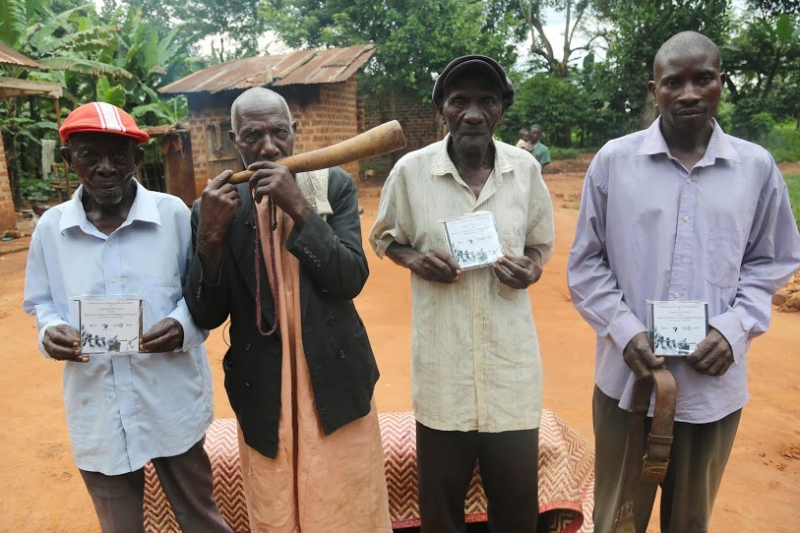
We then gave the trumpeter the music of the International Library of African Music. They had assembled a CD for us of Hugh Tracy’s recordings of the palace musicians that he recorded in 1952. The trumpeter loved the picture of the trumpets on the cover and knew some of the players, but he was certain he was not on the recording. “I was still learning during this time and was not good enough,” he said.
Ben Nsubuga Ntabula
Next we interviewed Ben Nsubuga Ntabula, a drummer:
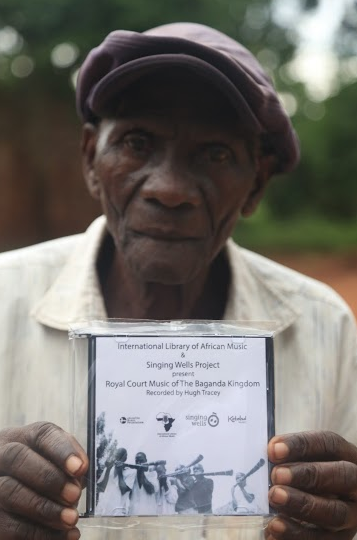
“My name is Ben Nsubuga Ntabula. My father was Ssemombwe and he taught me the drums (Ntamiyu). Fathers always taught the sons so there would be musicians at the palace for generations. I started to play at the palace in the 1940’s and believe I was born around 1929. Sadly, at the time of Hugh Tracy I also wasn’t good enough to be on those recordings.
We lived in the palace and when we were needed to play we played for the king. I loved it.
During the attack in 1966 my friend and I were at home. After the attack we didn’t go back. But in 1967 they brought us back to pay some wages and thank us for service I think. I am worried that they aren’t training the next generation and the music will be lost. But I also know if you play the music the children will come. I know if you set up a xylophone in a village and play good music, the children will come. We can’t blame them for not liking the music – they don’t hear it. When they hear it, they come and dance.
Kopoliano Kyobe
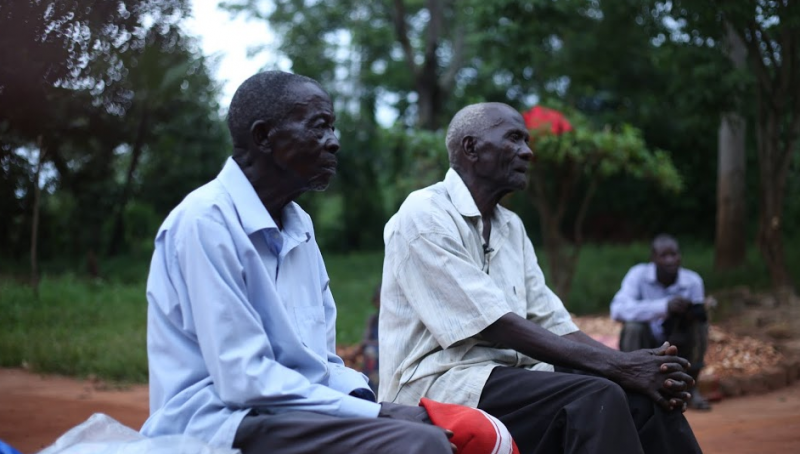
Finally, we had a brief discussion with Kopliano Kyobe:
“I was born in Ggavu on the main road. I learned to play the xylophone (Amadinda) as a young boy and they took me to the palace in 1960. In a typical day, all musicians hung out talking and practicing until we were called in to play. There was music all the time. I was not there for the attack but on the day of the attack my father was killed. They came into his village and saw a picture of the king on his wall. He asked them who they were and they shot him in bed.
After the reformation of the kingdom we played a couple of times but we have not played together since the sixties and no one listens to the music and the king never asks for musicians.“
Of course, each of these discussions is disturbing, but we share them to give you a sense of the desperate situation with this music. We have told you of the royal drums and our efforts to revive them. And of a younger, incredibly passionate drummer, Shaban, who is now extremely motivated about mastering these drums and teaching others. We’ve told you of the Bigwala, and the fact that there are now four new groups, and the farmers are growing long gourds again. This is what we are trying to do and the stories are up-lifting, but the reality is that these stories must be balanced by others – the stories of other palace musicians believing their music will die with them.
